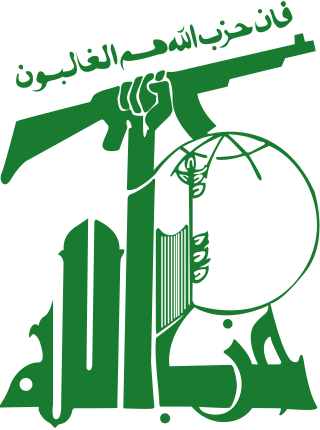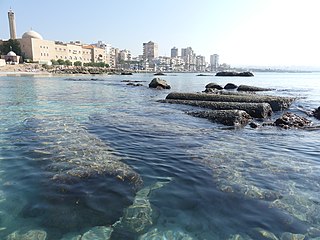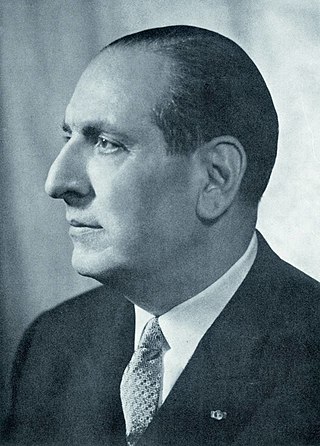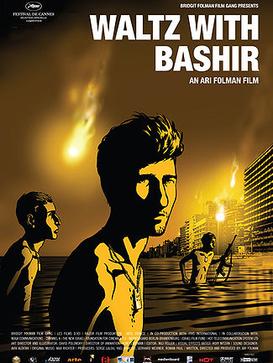
Hezbollah is a Lebanese Shia Islamist political party and paramilitary group, led since 1992 by its Secretary-General Hassan Nasrallah. Hezbollah's paramilitary wing is the Jihad Council, and its political wing is the Loyalty to the Resistance Bloc party in the Lebanese Parliament. Its armed strength was assessed to be equivalent to that of a medium-sized army in 2016.

Lebanon, officially the Republic of Lebanon, is a country in the Levant region of West Asia. It is bordered by Syria to the north and east, by Israel to the south, and by the Mediterranean Sea to the west; Cyprus lies a short distance away from the country's coastline. Lebanon is located at the crossroads of the Mediterranean Basin and the Arabian hinterlands. Lebanon has a population of more than five million people and covers an area of 10,452 square kilometres (4,036 sq mi). Beirut is the country's capital and largest city.

Tyre or Tyr, Sur, or Sour is a city in Lebanon, one of the oldest continuously inhabited cities in the world, though in medieval times for some centuries by just a small population. It was one of the earliest Phoenician metropolises and the legendary birthplace of Europa, her brothers Cadmus and Phoenix, as well as Carthage's founder Dido (Elissa). The city has many ancient sites, including the Tyre Hippodrome, and was added as a whole to the list of UNESCO World Heritage Sites in 1984. The historian Ernest Renan noted that "One can call Tyre a city of ruins, built out of ruins".

Beirut is the capital and largest city of Lebanon. As of 2014, Greater Beirut has a population of 2.5 million, which makes it the third-largest city in the Levant region and the thirteenth-largest in the Arab world. The city is situated on a peninsula at the midpoint of Lebanon's Mediterranean coast. Beirut has been inhabited for more than 5,000 years, making it one of the oldest cities in the world.

Mt. Lebanon is a Home rule municipality in Allegheny County, Pennsylvania, United States. The population was 34,075 at the 2020 census. It is a suburb of Pittsburgh. Established in 1912 as Mount Lebanon, the township was a farming community. With the arrival of the first streetcar lines and the development of the first real estate subdivision, both in 1901, it became a streetcar suburb, offering residents the ability to commute to Downtown Pittsburgh. Furthermore, the opening of the Liberty Tunnel in 1924 allowed easy automobile access to Pittsburgh. In 1975, the renamed Mt. Lebanon adopted one of the first home rule charters in Pennsylvania.

The Lebanese Civil War was a multifaceted armed conflict that took place from 1975 to 1990. It resulted in an estimated 150,000 fatalities and led to the exodus of almost one million people from Lebanon.
The music of Lebanon has a long history. Beirut, the capital city of Lebanon, has long been known, especially in a period immediately following World War II, for its art and intellectualism. Several singers emerged in this period, among the most famous Fairuz, Sabah, Wadih El Safi, Nasri Shamseddine, Melhem Barakat, Majida El Roumi, Ahmad Kaabour, Marcel Khalife, and Ziad Rahbani, who—in addition to being an engaged singer-songwriter and music composer—was also a popular playwright. Lydia Canaan was hailed by the media as the first rock star of the Middle East.

Miss Lebanon is the national beauty pageant of Lebanon. The winner is a representative of the Ministry of Tourism and is sent to represent Lebanon at Miss Universe and Miss World.

Charles Helou was a Lebanese politician and President of Lebanon from 1964 to 1970.

Tabbouleh, also transcribed tabouleh, tabbouli, tabouli, or taboulah, is a Levantine salad made mostly of finely chopped parsley, with tomatoes, mint, onion, soaked uncooked bulgur, and seasoned with olive oil, lemon juice, salt and sweet pepper. Some variations add lettuce, or use semolina instead of bulgur.

Yusuf al-Khal was a Lebanese-Syrian poet, journalist, and publisher. He is considered the greatest exponent of avantgardist prose poetry as well one of the pioneers of Arabic surrealist poetry.

The Independent Nasserite Movement – INM (Arabic: حركة الناصريين المستقلين-المرابطون, romanized: Harakat al-Nasiriyin al-Mustaqillin) or simply Al-Murabitoun (المرابطون lit. The Steadfast), also termed variously Independent Nasserite Organization (INO) or Movement of Independent Nasserists (MIN), is a Nasserist political party in Lebanon.

The 2006 Lebanon War, also called the 2006 Israel–Hezbollah War and known in Lebanon as the July War and in Israel as the Second Lebanon War, was a 34-day armed conflict in Lebanon, northern Israel and the Golan Heights. The principal parties were Hezbollah paramilitary forces and the Israel Defense Forces (IDF). The conflict started on 12 July 2006, and continued until a United Nations-brokered ceasefire went into effect in the morning on 14 August 2006, though it formally ended on 8 September 2006 when Israel lifted its naval blockade of Lebanon. Due to unprecedented Iranian military support to Hezbollah before and during the war, some consider it the first round of the Iran–Israel proxy conflict, rather than a continuation of the Arab–Israeli conflict.

Lebanon is among the oldest sites of wine production in the world. The Israelite prophet Hosea is said to have urged his followers to return to God so that "they will blossom as the vine and fame be like the wine of Lebanon, [and] their fragrance will be like that of Lebanon". The Phoenicians of the coastal strip were instrumental in spreading wine and viticulture throughout the Mediterranean in ancient times.

Waltz with Bashir is a 2008 Israeli adult animated war docudrama film written, produced, and directed by Ari Folman. It depicts Folman's search for lost memories of his experience as a soldier during the 1982 Lebanon War and the Sabra and Shatila massacre.

The Marine Commandos are an elite unit of the Lebanese Army. They are part of the Lebanese Special Operations Command. Established with assistance from the United States Navy SEALs and the British Royal Marines, they are tasked with conducting a variety of missions, particularly in a maritime environment, which include: sabotage, raids, beach landings and maritime counter-terrorism. The Marine Commandos were established in 1997, then got their administrative independence in July 2001.

There are about 53,000 to 75,000 Lebanese Uruguayans, or Uruguayans of Lebanese origin. The Lebanese are one of the larger non-European communities, though still not as large a group as most European groups. Relations between Uruguay and Lebanon have always been close.

The Official Lebanese Top 20 is the first weekly airplay chart in Lebanon, listing the most popular local and international hits across the country. The songs' popularity is solely determined by radio airplay frequency throughout a given week, audited and compiled by Ipsos SA. The Official Lebanese Top 20 was created by John Saad, an established Lebanese TV and radio personality. It is distributed through at least five media outlets ranging from TV stations to magazines and newspapers.

The Lebanese Forces was one of the main Lebanese Christian factions of the Lebanese Civil War. Originally an umbrella organization for different parties, the Lebanese Forces later became a separate organization. The Lebanese Forces replaced the previous Kataeb Regulatory Forces as the military arm of the Christian Kataeb Party. It was mainly staffed by Maronite Christians loyal to Bachir Gemayel, and fought against the Lebanese National Movement, the Palestine Liberation Organization and the Syrian Army among other enemies. The group gained infamy for their perpetration of the 1982 Sabra and Shatila massacre, which primarily targeted Palestinian refugees following Gemayel's assassination.


















